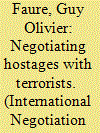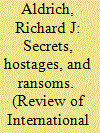|
|
|
Sort Order |
|
|
|
Items / Page
|
|
|
|
|
|
|
| Srl | Item |
| 1 |
ID:
180656


|
|
|
|
|
| Summary/Abstract |
Recent scholarship on care has continued to push the boundaries of care research beyond the Global North and beyond the usual areas of study. In the spirit of finding care in unusual and troubling places, this article examines the role of care in an unexpected location – namely, ransom kidnappings by Somali pirates. Drawing on accounts from the memoirs of former hostages, this study explores the complicated relational dynamics of care that emerge between the pirates and their hostages. In particular, it focuses on the ways in which the locations of the hostage situations shape the manner and quality of care across four geographical zones in Somalia. The analysis draws on a caringscape approach and focuses on the “bricolage of care” pieced together from available goods, the limited skills of the pirates themselves, and the skills and resources of the hostages. By providing an unflinching account of care in these difficult contexts, this article seeks a more robust understanding of the varieties of caring behavior across the human experience and a more nuanced sense of where care fits into a discussion of ethics in a globalized world.
|
|
|
|
|
|
|
|
|
|
|
|
|
|
|
|
| 2 |
ID:
116132


|
|
|
|
|
| Publication |
2012.
|
| Summary/Abstract |
This study examines 40 years of kidnapping incidents by terrorist groups and finds several interesting trends, including terrorist groups are engaged in more kidnapping than in years past, but the proportion of kidnapping among all terrorist events annually has remained fairly constant; the geographic concentration of kidnapping incidents has shifted from Latin America (1970s-1990s) to South Asia (2000s-present); left-wing Marxist revolutionary groups have kidnapped more than groups in other ideological categories, but there has been a significant increase over the past decade in kidnappings by Muslim extremist groups; terrorist groups overall appear far less interested in kidnapping for financial gain than for political or policy concessions; and terrorist groups are selective about the type of people they target for kidnapping, which is striking given that many other kinds of terrorist attacks (e.g. bombings) are indiscriminate with regard to victims. The article concludes with some implications and recommendations for future research.
|
|
|
|
|
|
|
|
|
|
|
|
|
|
|
|
| 3 |
ID:
032885


|
|
|
|
|
| Publication |
Washington, U.S.Government Printing Office, 1981.
|
| Description |
iii, 36p
|
|
|
|
|
|
|
|
|
|
|
|
Copies: C:1/I:0,R:0,Q:0
Circulation
| Accession# | Call# | Current Location | Status | Policy | Location |
| 020944 | 345.02540955/US 020944 | Main | On Shelf | General | |
|
|
|
|
| 4 |
ID:
137648


|
|
|
|
|
| Summary/Abstract |
There are few negotiations where it is so necessary to be fast and effective than in those that deal with hostages. This is an almost unfeasible task that has to be carried out with the most unlikely negotiator, the terrorist, in an extremely hostile context. Considering the issues at stake – the freedom of the hostages and, very often, their lives – a negotiator has to manage many challenges. There are seven dilemmas and paradoxes in reaching agreement. A negotiator has to solve a Shakespearian dilemma, manage contradictory objectives, deal with incompatible rationales, handle the toughness dilemma, come to grips with contradictions between empathy and assertiveness, handle cultural dilemmas, and cope with a moral dilemma.
|
|
|
|
|
|
|
|
|
|
|
|
|
|
|
|
| 5 |
ID:
160886


|
|
|
|
|
| Summary/Abstract |
Britain has long taken a firm public line against terrorist ransom, insisting that yielding to terrorist demands only encourages further acts of intimidation and kidnapping. Hitherto, academic research has tended to take these assertions of piety at face value. This article uses a historical approach to show that the British position has shifted over time and was often more complex and pragmatic. Indeed, Britain’s position with regard to kidnap and ransom insurance has, until quite recently, been rather ambiguous. We use the British case to suggest that, rather than dividing states into groups that make concessions and those that do not, it is perhaps better to recognise there is often a broad spectrum of positions, sometimes held by different parts of the same government, together with the private security companies that move in the shadows on their behalf. One of the few things that unites them is a tendency to dissemble and this presents some intriguing methods problems for researchers.
|
|
|
|
|
|
|
|
|
|
|
|
|
|
|
|
|
|
|
|
|